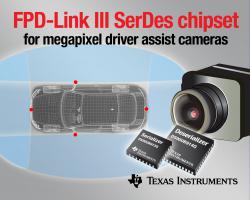
The SerDes data and video interface chipset comes with no software overhead, but just need fewer wires to seamlessly bridge video and data streaming information to megapixel driver assist camera modules, resulting in the industry’s least energy consumption and the latest driver safety upgrade.
TI explains in a statement that the system-level enhancement combines the smallest size to expand the use of camera safety systems into mid-and entry level vehicles.
The chipset is widely used in a range of ultra-compact applications from front-view camera for collision avoidance and traffic sign/pedestrian recognition to rear-view camera for backup protection to surround-view cameras for parking assistance.
Camera systems have become a safety standard, combining multiple camera modules with advanced image analysis, helping drivers to monitor road conditions, detect hazards and avoid collision.
Automotive safety system designers can use TI's FPD-Link III SerDes chipsets to connect cameras and displays to an electronic control unit (ECU) with thinner, more flexible cabling.
The DS90UB913Q and DS90UB914Q feature 25-mm2 footprint, supporting 10-MHz to 100-MHz pixel clock and 10- and 12-bit pixel depth, respectively.
Benefits
Especially, DS90UB914Q automatically adapts EQ gain in what the company said is the industry's first adaptive receiver EQ, compensating for dynamic and long-term changes in cable loss.
As continuous, bidirectional control channel on a single twisted pair cable provides low latency for precise multi-camera synchronization, the chipset also boasts fast response time, helping to increase drivers' safety.
Its lower serial line rates of up to 1.4 Gbps helps to drive down system costs, too
The DS90UB914Q is integrated a 2:1 multiplexer, allowing the ECU video processor to select content from two camera sources.
The SerDes chipset operates over the -40 degrees C to 105 degrees C temperature range, supporting heat-exposed installations.
Evaluation kits
The DS90UB913Q serializer and DS90UB914Q deserializer are supported by the SERDESUB-913ROS evaluation kit. It is available today for a suggested retail price of US$399.
IBIS models for the DS90UB913Q and DS90UB914Q are also available. Engineers designing with this SerDes chipset can ask questions and get answers from TI experts in the TI E2E™ Community High Speed Interface Forum.
The DS90UB913Q and DS90UB914Q are available now for a suggested retail price of US$5.36 for each device in 1,000-unit quantities. The DS90UB913Q serializer is supplied in a 32-pin, 5-mm x 5-mm QFN package, while the DS90UB914Q deserializer is offered in a 48-pin, 7-mm x 7-mm QFN package.
According to the market research firm, chips for the automotive chip market was the fastest-growing semiconductor market, followed by the industrial electronics chip market in 2011.
TI has a broad range of automotive chip solutions from RF ID chip to analog mixed signal solution to power management ICs, to DSP to interface chips to microcontrollers for automotive market .
Automotive chip solutions represented 8% of the TI’s fiscal 2011 revenues, which topped US$13.7 billion.
TI has been supplying world’s top-tier car makers like Hyundai, Audi, Suzuki, GM, Ford, Renault, Chrysler, Kia and Nissan.

